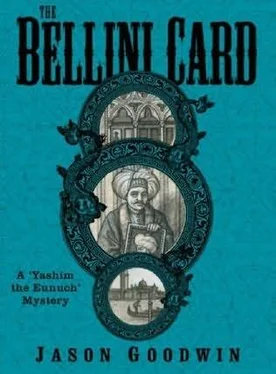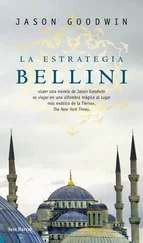Jason Goodwin - The Bellini card
Здесь есть возможность читать онлайн «Jason Goodwin - The Bellini card» весь текст электронной книги совершенно бесплатно (целиком полную версию без сокращений). В некоторых случаях можно слушать аудио, скачать через торрент в формате fb2 и присутствует краткое содержание. Жанр: Исторический детектив, на английском языке. Описание произведения, (предисловие) а так же отзывы посетителей доступны на портале библиотеки ЛибКат.
- Название:The Bellini card
- Автор:
- Жанр:
- Год:неизвестен
- ISBN:нет данных
- Рейтинг книги:5 / 5. Голосов: 1
-
Избранное:Добавить в избранное
- Отзывы:
-
Ваша оценка:
- 100
- 1
- 2
- 3
- 4
- 5
The Bellini card: краткое содержание, описание и аннотация
Предлагаем к чтению аннотацию, описание, краткое содержание или предисловие (зависит от того, что написал сам автор книги «The Bellini card»). Если вы не нашли необходимую информацию о книге — напишите в комментариях, мы постараемся отыскать её.
The Bellini card — читать онлайн бесплатно полную книгу (весь текст) целиком
Ниже представлен текст книги, разбитый по страницам. Система сохранения места последней прочитанной страницы, позволяет с удобством читать онлайн бесплатно книгу «The Bellini card», без необходимости каждый раз заново искать на чём Вы остановились. Поставьте закладку, и сможете в любой момент перейти на страницу, на которой закончили чтение.
Интервал:
Закладка:
Some of the gondoliers, looking up, seemed transfixed. They would have a song before the month was out, about the love of a woman for an infidel, and her years of torment, and how in the end he had come to woo her in spite of the Austrians and their cannons.
The crimson gondola slipped from the center of the procession and with a sweep of his oar the gondolier brought the boat up against the landing stage.
The pasha stood up, carrying a small box wrapped in gold paper.
The unnatural silence broke at once. Wild conjectures circulated among the crowd, which were embroidered and improved as the day wore on. Some were to say that the pasha had brought her a sultan’s diadem; others that it was a gossamer handkerchief that the sultan bestowed, each night, upon the concubine destined to share his bed. It was said that the Aspis, in their days of power, had rendered the sultan a service so great he had found no way of repaying it until now, when the Aspis groaned like the rest beneath the heel of Austria. Some said it was money. Some said it was jewels. Some said it was a holy relic that the Venetians had missed when they sacked Constantinople in 1204.
A wag said it was a box of Turkish delight.
What no one could possibly have guessed was the truth, which Yashim confessed to the contessa when Antonio had shown him upstairs.
She turned reluctantly from the window.
Yashim bowed. “I must apologize, signora, for the intrusion. The box is empty.”
She tucked back a strand of her hair.
“How disappointing,” she said quietly. She dismissed Antonio with a wave of her hand.
When he had gone she said, “I suppose that you have come to kill me, pasha efendi, the way you killed the others.”
“No, Contessa. I hope I have come to save you.”
She gave a small smile. “No one can save me. It is written-surely, as an Ottoman, you know that.”
She put a hand under her hair and swept it up, exposing her slender neck.
Yashim held up his empty hands.
“No bowstring, Contessa. You sent to Istanbul-and I am here.”
She glanced at him, sideways, her hand slipping slowly from her neck so that her hair fell in golden sheaves.
Yashim knew more than enough about pretty girls. The sultan’s harem, where he could come and go at will, was full of girls whose charms were those of any young animal. They had clear eyes, and smooth skin, and the form and figure of nymphs released into the real world, supple and glowing. Their feelings raced across their lovely faces, registering each moment of happiness or jealousy or fear with a perfectly unguarded openness. Pretty girls: you smiled to see them, like puppies chasing their own tails.
But the contessa was a woman.
“I sent to Istanbul?” She pushed off from the windowsill and crossed the room. “You seem very sure, my pasha-I don’t know your name, I’m afraid.”
“I am Yashim,” he replied with a short bow. “I serve the sultan.”
It was rather less than the truth, but it was not quite a lie.
“You sent Sultan Abdulmecid a message-you made an offer. The Bellini portrait of his ancestor.”
For a moment she checked herself. “Is that what you told them? Boschini. Barbieri. And now they’re dead.”
And then a foil was in her hand.
“For myself, I may determine the time and the place,” she said, raising the point of the foil.
There was no button on the tip.
“Com’era, dov’era,” she murmured. “In guardia.”
He saw her lift her knee, and then she was on him in a blur, a whirl of stamping feet and lifted shoulders-and a blade sparked by his ear as Yashim launched himself to the ground.
He rolled, twice, and the point of the blade skittered across the marble at his feet.
He sprang up, twisting and backing. The contessa had recovered her position: she stood with her left hand free, feet apart, breathing through parted lips. For a second he thought that the blade had snapped from the hilt, before he saw the point swing out only inches from his eyes.
As Carla lunged, Yashim whipped his head sideways and, at the same second, he took a step forward, against his instinct to pull back. They were almost beside each other, flank to flank. Yashim cracked his right arm down and felt his sleeve brush hers as she let her arm drop. She came out of it with a sweep of the foil, away from him, using the weight of the sword to bring her around.
She had her elbow back, drawing the tip of her foil away. Yashim saw it retreating through the air, like a mosquito, and flung himself into a left-hand roll.
The contessa sprang through his wake, making a diagonal pass that would deliver her at his right.
For a moment, as he raised his head, Yashim was disoriented.
Two things ran through his mind.
One was a remark about fencing he had read once in a French novel. “The art of fencing consists in two things, and two things only: to give, and not to receive.”
The other was: ignore the tip and watch the feet.
The feet! Slamming both hands onto the floor, Yashim flung out one foot across the marble in an arc, hooking the contessa’s feet and sweeping them from under her.
She rolled backward and sprang to her feet. Yashim was standing again. They were about six feet apart.
She rubbed her hand across her hip.
Her blue eyes glittered.
Blue eyes: Yashim raised a fist and uncoiled two fingers, the old sign to ward off the evil eye.
The contessa understood it. She began to smile.
Her smile broke into a snarl and she clapped her feet to the ground and sprang.
Yashim saw the point of her sword flying through the air.
The point!
He parried, chopping down as the blade soared toward his chest.
She must have been surprised as the tip moved: he saw her eyes travel to the point. But in a moment she was on him again, flicking the point almost effortlessly upward, toward his abdomen. He sliced down, and as the blade struck his forearm he stepped forward and sideways and felt her hair slip through the fingers of his left hand.
He almost had her.
She curvetted around again, slipping her head to one side, drawing back.
His hand was empty. The other was bleeding.
There was no edge on a foil’s blade, of course: only the point could kill. But the contessa’s foil moved fast enough to draw blood.
“You are confused about the rules, pasha efendi,” Carla said. She had adopted her guard again.
Yashim was watching her feet.
“I follow the pattern,” he said shortly. As he spoke he took a step toward her, hand spread, and then, as she turned the nails of her sword hand uppermost, he stepped back again, lightly and to one side.
She eased herself around to face him again, half turning her hand: now her nails were down.
He wondered if she would allow him to make the same maneuver twice.
He hoped so, for behind her, now slightly to her right, was the collection of weapons he had made Palewski describe, in minute detail, as they sat together in the smoke of la signora’s kitchen.
And beneath him, laid out in colored marble on the floor, was the pattern he already knew.
They had been following it from the beginning. Breaking ground and giving ground, back and forth-and always to the side. An endless knot, inexorably rotating.
He needed two more points. Two more would bring him around, but the next was the hardest. The pattern was not completely regular. The next point of the pattern brought you closer in, unguarded on either side.
He raised his hand to his turban, in perplexity.
Carla didn’t wait for him to finish the move.
There is an attack in fencing called the fleche: properly performed, it is the killer stroke, if any stroke may be so called. The feet come together; the body is launched; blade and body are concentrated behind the point with enormous speed and, regardless of the attacker’s build, also huge strength.
Читать дальшеИнтервал:
Закладка:
Похожие книги на «The Bellini card»
Представляем Вашему вниманию похожие книги на «The Bellini card» списком для выбора. Мы отобрали схожую по названию и смыслу литературу в надежде предоставить читателям больше вариантов отыскать новые, интересные, ещё непрочитанные произведения.
Обсуждение, отзывы о книге «The Bellini card» и просто собственные мнения читателей. Оставьте ваши комментарии, напишите, что Вы думаете о произведении, его смысле или главных героях. Укажите что конкретно понравилось, а что нет, и почему Вы так считаете.












